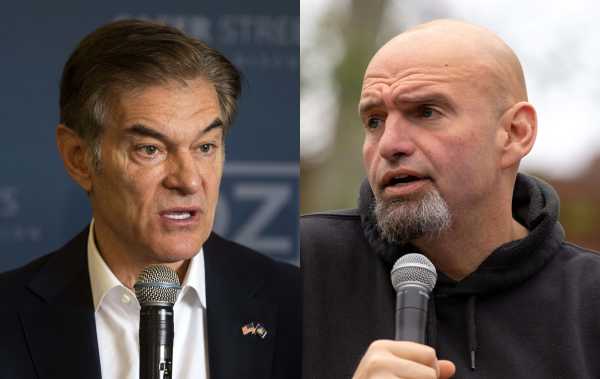
Part of The 2022 midterm elections, explained
In a campaign statement before the lone debate in the Pennsylvania Senate race and in his opening remarks, Democratic nominee John Fetterman tried to temper expectations for his performance and confront the “elephant in the room”: that due to his ongoing recovery from a recent stroke, he would struggle with his words in a live, rapid-fire format.
In the debate Tuesday night, Fetterman, who had a stroke in May, stumbled on his words as his campaign had anticipated, making halting statements and reacting slowly to remarks made by his opponent. Fetterman is grappling with an auditory processing disability as part of his recovery. Because of that, he has trouble parsing sounds in real time. He used closed captions throughout the debate to keep up with the questions moderators were asking and the statements his Republican opponent, Mehmet Oz, was making.
Fetterman’s struggles meant he often stopped short of providing in-depth answers on different questions. The candidates traded barbs on some big issues — crime and health care — and potentially significant policy statements on abortion (Oz) and fracking (Fetterman). But the debate yielded fewer exchanges and confrontations because the format was not conducive to factoring in the ongoing auditory issues Fetterman is navigating.
Debates are quick and spontaneous by nature, and can be much more difficult to participate in with the added delays of closed captions and auditory challenges if those aren’t properly accommodated. Oz has some major weaknesses as a candidate, but it was hard for Fetterman to elaborate on them in real time.
Related
John Fetterman survived a stroke. It could be an asset if he’s elected.
Fetterman instead focused on his connection to Pennsylvania — he has previously mocked Oz for moving to the state for the Senate race — and stressed his willingness to continue advocating for working people.
“My campaign is all about fighting for anyone in Pennsylvania that ever got knocked down and had to get back up again,” he said. “I had a stroke. He’s never let me forget that.”
Oz mostly avoided going after Fetterman’s health, instead attacking him on the economy and crime, two issues Republicans see as weaknesses for Democrats in the midterms. “John Fetterman takes everything to the extreme,” he argued. “These radical positions extend beyond crime.”
Fetterman’s campaign had agreed to the debate after Oz pressured the candidate to do so earlier this year. Fetterman’s decision to participate in the debate was ultimately revealing of the state of his ongoing recovery and of how the format didn’t factor in these challenges.
What we learned on policy
Although the debate had its constraints, there were key moments that were more informative, particularly when the candidates were pressed on their policy positions on issues like abortion rights and fracking.
Oz’s position on abortion has been somewhat murky up until this point. Most recently, Oz has described himself as “strongly pro-life” and someone who would support abortion exceptions for instances of rape, incest, and threats to the health of the mother. During the GOP primary, he wasn’t so nuanced, calling abortion at any stage of pregnancy “murder.” He has also said that he wouldn’t back criminal penalties for people who seek abortions or doctors who perform them.
Related
How the Pennsylvania Senate race got so close
Additionally, Oz had declined to take a position on a 15-week abortion ban introduced by Sen. Lindsey Graham (R-SC).
When asked about the Graham ban during the debate, Oz again dodged the question, though he did say that he believed the decision to obtain an abortion should be between “women, doctors, and local political leaders,” reiterating the position that state governments should be the ones making that decision.
Fetterman emphasized that he supported upholding Roe and would vote to codify its protections into federal law if he was elected. He stressed, too, that the decision to have an abortion should be between a woman and her doctor.
Fetterman, when asked, said he supported fracking, though he had said he opposed it in a 2018 interview while running for lieutenant governor. Since then, he has said that he backs the practice, which has supported thousands of jobs in the oil and gas industry in the state.
When asked about the inconsistency, Fetterman stressed his backing for the practice but did not address the change in position.
Beyond specific issues, the two candidates also sought to hit each other on their personal attributes, with Fetterman referencing Oz’s time peddling false medical claims and how that approach extends to his run for the Senate. “It’s the Oz rule. He’s on TV and he’s lying,” Fetterman said. Oz, meanwhile, attempted to paint Fetterman as too out of touch with the voters of Pennsylvania, citing his record on crime and support for pardons and commutations as the chair of the state’s Pardon Board.
The most immediately consequential question the debate produced, though, is also one we don’t know the answer to yet: Will Fetterman’s stumbles, or anything either candidate said, put off voters in an extremely tight race that could determine control of the Senate?
“Under normal circumstances, the debate would have to be considered a significant setback for Fetterman, as his performance certainly wasn’t strong, and Oz maintained the upper hand for most of the evening,” said Chris Borick, a nonpartisan Pennsylvania-based pollster. “But these aren’t normal circumstances, and it’s hard to determine how voters evaluate Fetterman given his stroke.”
Will you support Vox’s explanatory journalism?
Millions turn to Vox to understand what’s happening in the news. Our mission has never been more vital than it is in this moment: to empower through understanding. Financial contributions from our readers are a critical part of supporting our resource-intensive work and help us keep our journalism free for all. Please consider making a contribution to Vox today.
Sourse: vox.com